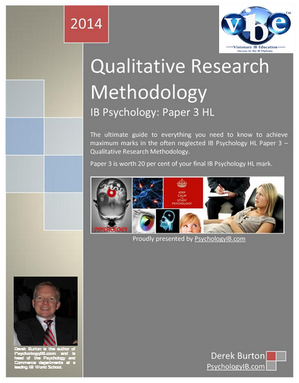THe Perfect responseHigher level Paper 3: Qualitative Research Methodology is often not taught well, often not well understood, and often not revised as well as it should be. The IB Psychology HL Paper 3: Qualitative Research Methodology is worth a huge 20% of your final grade. You cannot underestimate the importance of this section of the IB Psychology course. If you do badly in your Paper 3 examination you will lose at least one mark. Research Methods has been pinpointed as being the single most difficult part of the IB Psychology course to teach, learn and study for. The Ultimate Guide to Qualitative Research Methodology presents key notes for each of the 18 different learning objectives, summarised with useful exam tips and tricks to memorise the information. What makes this the best Paper 3 learning resource is that it provides the students with over 20 pages of targeted questions, covering basic knowledge, practice exam questions using stimulus material, and actual IB Paper 3 examination questions. It is certainly not easy to achieve maximum marks in the IB Psychology HL Paper 3 examination. Many teachers leave it to teach last, rush through it and wonder why their students never attain that IB Psychology 7 in the end. Here is the type of response the IB Psychology examiner will award maximum marks for. It should give you a really good indication of how to write a succinct response to an IB Psychology exam question and still be awarded maximum marks. Here is a model response to a Paper 3 exam question: | |
Inductive content analysis is a measure of analysing data in a qualitative study. It involves the grounded theory – transferring a low order theme to a high order theme and IPA (Interpretative Phenomenological Analysis).
The data collection is the first step which is done by semi-structured interview in this stimulus material. The data from the interview was “recorded” in the stimulus material which is then transcribed either by verbatim or postmodern transcription.
Recorder themes are identified by transcription and then a step-by-step analysis is done to classify different sub-themes.
The reading and re-reading of the data transcription several emergent themes are extracted which are then classified into different themes. These different sub-themes are analysed critically and further categorised into higher order themes. This categorisation process is evident in the stimulus material – “the content analysis showed that participant’s motivation could be categorised into four major or higher-order themes”.
The stimulus material provides a detailed description of the four higher-order themes such as excitement and entertainment, emotional coping, and escaping from reality and interpersonal and social needs.
These higher-order themes are then produced as a summary table after no more themes can be identified.
This summary table is the produced account which is used for deriving the conclusion. As in the stimulus material “the researchers concluded that online gaming had the potential to be addictive.”
Each step of the inductive content analysis requires credibility checks. For example, credibility checks by other researchers, coding, and reflexivity. These credibility checks appear on the margins and finally produce an account of the participants view rather than the researchers, thereby making the study trustworthy. Though the stimulus material did not present any kind of credibility checks employed by the researches, there is evidence of four higher-order themes makes the conclusions reliable as the study measures what it is expected to (psychological motivation to participate in online games).
| IB Psychology has a specially prepared revision guide to help you achieve maximum marks here. | Do not just hope for the best in your final paper - the IB Psychology Paper 3 examination. Take it seriously and prepare yourself. Try our revision guide, it is the only IB Psychology guide specifically targeted at the Paper 3 Exam. Author: Derek Burton – Passionate about IB Psychology |





 RSS Feed
RSS Feed